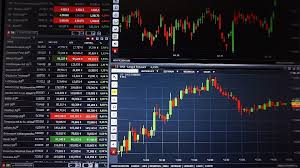The Dynamic World of Forex Currency Trading Strategies and Insights

The Dynamic World of Forex Currency Trading: Strategies and Insights
Forex trading is one of the most popular forms of investment today, attracting both novice and experienced traders globally. With its high liquidity and the ability to trade 24 hours a day, forex has become an enticing prospect for those looking to maximize their financial potential. forex currency trading Forex Brokers in South Africa offer various services to facilitate these trades, ensuring that traders have access to the market and the tools needed to succeed.
What is Forex Trading?
Forex trading, or foreign exchange trading, involves the buying and selling of currencies in the foreign exchange market. This market is decentralized and operates globally, allowing participants to trade an extensive range of currency pairs. The primary objective is to profit from changes in exchange rates between different currencies. For instance, if a trader believes that the euro will strengthen against the USD, they will buy EUR/USD with the expectation of selling it later at a higher price.
Understanding Currency Pairs
In forex trading, currencies are traded in pairs. Each pair consists of a base currency and a secondary currency (quote currency). The value of the pair reflects how much of the quote currency is needed to purchase one unit of the base currency. Major currency pairs include EUR/USD, GBP/USD, and USD/JPY, which are widely traded due to their liquidity and stability. Minor and exotic pairs also exist, offering opportunities for traders willing to venture beyond the major currencies.
The Role of Forex Brokers
Forex brokers play a crucial role in facilitating currency trades for individual traders and institutional investors. They provide trading platforms, access to market data, and tools for analysis. Brokers also offer leverage, allowing traders to control larger positions than their initial capital would normally allow. However, it’s essential to select a reputable broker, as the quality of service can significantly impact trading performance. Be sure to consider factors such as regulation, trading fees, and customer support when choosing a broker.
Trading Strategies for Success
Successful forex trading requires not only an understanding of the market but also a well-formulated strategy. Here are some common trading strategies that traders utilize:
1. Day Trading
Day trading involves opening and closing trades within the same day. This strategy is ideal for traders looking to capitalize on short-term price movements. It requires constant monitoring of the market and quick decision-making, making it best suited for active traders.
2. Swing Trading

Swing traders hold their positions for several days or weeks, aiming to profit from fluctuations in price swings. This approach allows traders to take a more measured approach, using technical analysis to identify optimal entry and exit points based on market trends.
3. Scalping
Scalping is a high-frequency trading strategy that involves making numerous trades throughout the day to exploit small price movements. Scalpers typically hold positions for only a few seconds to a few minutes, aiming for small profits that accumulate over time.
4. Position Trading
Position trading involves holding trades for an extended period, often based on fundamental analysis and long-term market trends. Traders using this strategy look for major price movements and are less concerned with short-term volatility.
Technical and Fundamental Analysis
To successfully navigate the forex market, traders often rely on two main forms of analysis: technical and fundamental.
Technical Analysis
Technical analysis focuses on historical price data and patterns. Traders use charts, indicators, and various tools to identify trends and predict future movements. Commonly used indicators include moving averages, relative strength index (RSI), and Bollinger Bands.
Fundamental Analysis
Fundamental analysis looks at economic factors, such as interest rates, inflation, and political stability, that may impact currency value. Traders use economic calendars to keep track of important data releases and events, which can affect market sentiment and subsequently influence currency prices.
The Importance of Risk Management
One of the most critical aspects of forex trading is risk management. Traders face significant risks in the highly volatile forex market, making it essential to implement risk management strategies. Setting stop-loss orders, diversifying trades, and adhering to a well-defined trading plan are key elements in minimizing risk and protecting one's trading capital.
Conclusion
Forex currency trading presents vast opportunities for profit but also comes with its challenges. By understanding the market dynamics, employing effective trading strategies, and committing to continuous learning and improvement, traders can enhance their chances of success. Whether you are new to forex trading or an experienced trader, staying informed and adapting to market changes is essential for long-term profitability.
As you embark on your forex trading journey, remember to research and choose a credible forex broker, stay abreast of global economic events, and invest time in honing your trading skills. With dedication and a strategic approach, you can navigate the exciting yet complex world of forex trading effectively.
- ! Без рубрики
- 123
- 1bet5
- 1w
- 1Win AZ Casino
- 1win casino spanish
- 1win fr
- 1win Turkiye
- 1winRussia
- 1x-bet.downloa
- 1xbet
- 1xbet apk
- 1xbet Bangladesh
- 1xbet Casino AZ
- 1xbet casino BD
- 1xbet india
- 1xbet Korea
- 1xbet KR
- 1xbet malaysia
- 1xbet Morocco
- 1xbet pt
- 1xbet RU
- 1xbet russian
- 1xbet russian1
- 1xbet-uzbek.org
- 1xbet1
- 1xbet2
- 1xbet3
- 1xbet32
- 1xbet3231025
- 1xbet4
- 1xbet51
- 1xbet52
- 1xbet61
- 1xbet62
- 1xbet82
- 22bet
- 22Bet BD
- 22bet IT
- 22betde.de
- 888starz bd
- a16z generative ai
- a16z generative ai 1
- Aanbiedingen
- aarhusaffairs.dk
- adobe generative ai 1
- adobe generative ai 2
- ambridgeevents.com
- AU T1_19264 (3)
- austria
- Aviator
- aviator brazil
- aviator casino DE
- aviator casino fr
- aviator IN
- aviator ke
- aviator mz
- aviator ng
- b1bet BR
- bbrbet colombia
- bbrbet mx
- bcg4
- bcgame1
- bcgame2
- bcgame3
- beach5.ch_betonred
- bet1
- bet2
- betwinner1
- betwinner2
- bizzo casino
- blog
- book of ra it
- Brand
- brucebetdeutsch.com
- Canada Casino
- casibom tr
- casino
- casino en ligne argent reel
- casino en ligne fr
- casino svensk licens
- casino utan svensk licens
- casino zonder crucks netherlands
- casino-glory india
- casino1
- casino101
- casino102
- casino103
- casino2
- casino201
- casino202
- casino203
- casino241
- casino242
- casino25
- casino27
- casino3
- casino4
- casino5
- casino6
- casino7
- casinos1
- chat bot names 4
- ciroblazevic.hr
- cityoflondonmile3
- cityoflondonmile4
- comedychristmas.ch
- crazy time
- csdino
- Cursussen
- done
- DONE 240679 Kli 09.10
- DONE 241993 16.10
- DONE 4447 Focus 13.10
- done 7 slots
- drivein.hr
- dxgamestudio.com
- extradition
- focus basari
- fortune tiger brazil
- freevoice.hr
- fysiotek.gr
- fzo.hr
- Gama Casino
- Game
- gameaviatorofficial.com
- gate-of-olympus.gr
- Gegmany Casino3
- Gegmany Casino5
- how does generative ai work
- icestupa10
- icestupa13
- icestupa2
- icestupa3
- icestupa4
- icestupa5
- icestupa6
- icestupa9
- IGAMING
- Indonesia Casino
- italiandocscreening
- ivibetcasino.ch
- kaszino1
- khelo24betoficcial.com
- king johnnie
- lilyedu.uz
- Maribet casino TR
- Maxi reviewe
- mini-review
- Mini-reviews
- mombrand
- mono brand
- mono slot
- Mono-brand
- Monobrand
- monobrend
- monogame
- monoslot
- moon-princess-100.com
- mostbet
- mostbet GR
- mostbet hungary
- mostbet italy
- mostbet norway
- mostbet tr
- Mr Bet casino DE
- mr jack bet brazil
- mx-bbrbet-casino
- my-1xbet.com
- news
- Nieuws
- omitapparel
- ozwin au casino
- Pacifica_bl95un3ifza
- palazzocornermocenigo
- PBN
- pelican casino PL
- Pin UP
- Pin Up Brazil
- Pin UP Online Casino
- Pin Up Peru
- pin-up-casino-giris.net
- pinco
- Pinco türkiye
- PinUp
- Pinup casino
- pınco
- plinko
- plinko in
- plinko UK
- plinko_pl
- pocketoption1
- pocketoption2
- pocketoption3
- Post
- primexbt1
- primexbt2
- primexbt3
- Qizilbilet
- Ramenbet
- Ramenbet
- Review
- Reviewe
- reviewer
- rise-of-olympus-100.com.gr
- sansalvatrail.ch
- schweizbahigo.ch
- Shows
- Slot
- Slots
- Slots`
- space-interiors
- sudstvo.mk
- sugar rush
- sugar-rush-1000.com.gr
- sweet bonanza
- T3_19264_a
- Thailand Casino
- thereoncewasacurl.com
- Trading3
- traiding1
- traiding2
- UK Casino
- ulola.hr
- Uncategorized
- vavada1
- verde casino poland
- verde casino romania
- Vovan Casino
- vulkan vegas germany
- Комета Казино
- Макси-обзорник
- нуы
- сателлиты
- сеточный домен
